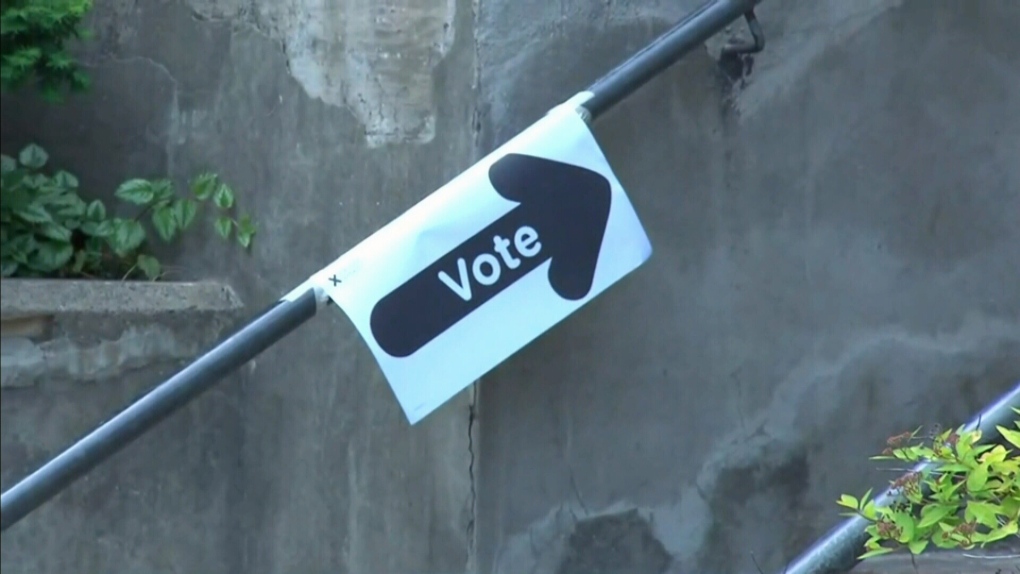
Here's how you can cast an advance ballot in Ottawa for the provincial election
 Advance polling stations are open across Ottawa until Saturday, May 28. (CTV News Ottawa)
Advance polling stations are open across Ottawa until Saturday, May 28. (CTV News Ottawa)
Ottawa voters can cast their ballot for a candidate in the Ontario election campaign this weekend.
Advance polls opened on Thursday and are open daily until Saturday, May 28 in all ridings across Ottawa. Election day is schedule for Thursday, June 2.
ADVANCE POLL LOCATIONS
For advance voting locations in each riding, click the riding name:
To find out your electoral district, visit the Elections Ontario website.
VOTING HOURS
Polling stations are open from 10 a.m. to 8 p.m. daily until May 28.
WHAT DO I NEED TO VOTE?
Elections Ontario says if you are on the voters list, you will receive a voter information card in the mail. If you have a voter information card, you need to show one piece of ID with your name on it to vote. Accepted ID includes:
- Birth certificate
- Canadian citizenship card
- Canadian passport
- Credit/debit card
- Employee card
- Indian status card
- Ontario health card
- Student card
- Union card
- Veterans Affairs health card
- Any document issued by the Government of Canada or the Government of Ontario
If you don't have a voter information card, you will need to show a piece of ID with both your name and address on it. For more information, visit the Elections Ontario website.
AM I REGISTERED?
Elections Ontario allows you to check and see if your name is on the voters list.
Visit https://eregistration.elections.on.ca/en/home until May 23 to confirm, update or add your voter information. A voter information card with information on when and where to vote will be mailed to you.
If you are not on the voters list, you will not receive a voter information card and must present one piece of ID showing both your name and current residential address to register and receive a ballot.
CTVNews.ca Top Stories

Trend Line Anger, pessimism towards federal government reach six-year high: Nanos survey
Most Canadians in March reported feeling angry or pessimistic towards the federal government than at any point in the last six years, according to a survey by Nanos Research.
B.C. child killer's lawyer walks out of review hearing
The lawyer representing child-killer Allan Schoenborn walked out of his client's annual review hearing Wednesday – abruptly ending proceedings marked by tense exchanges and several outbursts.
'A living nightmare': Winnipeg woman sentenced following campaign of harassment against man after online date
A Winnipeg woman was sentenced to house arrest after a single date with a man she met online culminated in her harassing him for years, and spurred false allegations which resulted in the innocent man being arrested three times.
How to avoid the trap of becoming 'house poor'
The journey to home ownership can be exciting, but personal finance columnist Christopher Liew warns about the trappings of becoming 'house poor' -- where an overwhelming portion of your income is devoured by housing costs. Liew offers some practical strategies to maintain better financial health while owning a home.
Juror dismissed in Trump hush money trial as prosecutors ask for former president to face contempt
Prosecutors in the hush money trial of Donald Trump asked Thursday for the former president to be held in contempt and fined because of seven social media posts that they said violated a judge's gag order barring him from attacking witnesses.
Why drivers in Ontario, Quebec and Atlantic Canada will see a gas price spike, and other Canadians won't
Drivers in Eastern Canada face a big increase in gas prices because of various factors, especially the higher cost of the summer blend, industry analysts say.
It's the biggest election in history. Here's why few Indians in Canada will take part
In the Indian general election that gets underway on Friday, almost a billion people are eligible to vote, but a vast majority of the overseas Indian community in Canada won't be casting a ballot.
McDonald's customers left with 'zero value' collection of free hot drink stickers after company ends program
It took years for Vinnie Deluca to collect more than 400 cards worth of free McDonald's McCafe coffee, a collection that now has "zero value" after the company discontinued the program.
Getting the lowest mortgage rates in a high interest rate world
The challenges facing home buyers mean it's all the more important to do research and negotiate on rates, mortgage experts say, though they also caution that there's more to focus on than just what looks like the cheapest upfront option.































